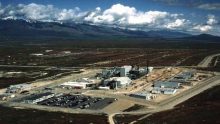Since the mid-1990s, external finance to Africa’s power sector has averaged only around US$600m per year of public assistance, plus a similar volume of private finance, according to the World Bank. Africa’s critical need for development requires rapid and effective solutions. With the proven economic setbacks of poor access to power, the crisis should be approached by exploring “All Options”.
With a quarter of the earth projected to be Africans by 2050, population size is expected to reach 2.4 billion people in that same year. If the current power demand and supply gap was matched today, in many African countries, the imminent population growth is bound to disrupt that balance in about a decade. Investment and policy efforts should therefore take a long term view, in order to meet – not just today’s needs – but tomorrow’s demand. This scenario is also a broad indication of the size of the market and the huge levels of power investments required.
Mini-Grids and Off-Grid (MG & OG) power solutions are a strategic fit for Africa. There are huge investment opportunities in this area. Sadly, the economic case for MG & OG is neglected, the size of the opportunity is underreported, the investment considerations are poorly understood, and government support is conspicuously absent. Enterprise concerns such as large mines, large agricultural farmlands and manufacturing centers – Africa’s typical productivity pulse – have power demand patterns that are huge and unique. When they are tied back to grid-electricity, they take disproportionate portions of already insufficient power or become stifled themselves if not prioritized.
Organizations with MG & OG capacity could target specific energy markets in Africa and utilize diverse models to tap into opportunities that are largely unexplored. Ambitious grid electricity projects have continued to come short of expectations; which is a loud call for concerned countries to leverage MG & OG solutions.
In Nigeria for example, 16 years of ambitious and fossil-dominated attempts at grid-electrification has not answered many critical question for that country’s power sector.
The Investors’ consideration
1Size of the opportunity
The attractive features of MG & OG systems make them specifically suitable for Africa. This includes operational flexibility & adaptability, environmental friendliness, cost advantages and the ability to de-risk power-related, security concerns. With countries like Nigeria, generating less than one-third of its forecasted peak demand (peak generated = 3966.4MW & peak demand forecast = 12,800MW); the market size of decentralized power systems is seen to be enormous.
Unreliable grid supply in African countries compel many households to resort to Diesel and Petrol-based captive electricity generators. The market size of Off-Grid solutions such as portable Solar PVs broadly translates to the number of household in Africa. The over 600 million (of 1.1 billion) Sub-Saharan Africans that do not have access to stable power supply are in need of affordable (alternative) energy solutions. Opportunities across different markets in Africa may differ in ways that reflect specific regulatory environments, development and economic conditions.
Mini Grid systems such as Wind Turbine farms, Hydro Plants, Solar Systems, (even fossil-fueled generators) that generate between 2MW and 20 MWs can serve several clusters of on-grid and off-grid niche markets. Projected population explosion in Africa suggests that demand for electricity and decentralized systems such MG & OG will also rise going forward. The investment attractiveness is enhanced in countries with good Feed-in policy and Feed-In Tariffs (FITS). Nigeria is currently expanding its Feed-in policy and framework in the so-called “Willing Buyer, Willing-Seller” scheme.
2Regulation
Narrow policy frameworks for Mini-Grids and Off-Grid solutions may lower their profitability and attractiveness. Since deployment options and regulatory support will also be narrow. In Nigeria for example, power generation and distribution laws and policies were (until the ongoing reforms) skewed in favor of grid-electricity (a clear relic of the past era of utility ownership by the state).
However, there are massive regulatory reviews across energy markets in Africa. The gradual exit or unbundling of state-owned utilities in many countries have broadly improved the overall investment attractiveness of the regions’ power sectors. But these reforms themselves come with inherent risks; often shown when they go on for too long or become devoid of clarity. In environments with reasonable instability and a history of wanton program/policy overhaul; investor will have more to do in contending with political risks. This was fairly common in Africa where election-cycle politics and regime changes can disrupt programs.
Programs such as President Barack Obama’s Power Africa Initiative and the recent passage of the U.S. “Electrify Africa Act” have the capacity to lower the risk in power sector investments; for the region. Especially for investors from North America. Local investors may also benefit through diverse partnership frameworks, service provision and equipment merchandizing opportunities. These American initiatives could be replicated by governments and investors from other regions such as South-East Asia and Europe; further expanding the scope of the global
& external intervention in Africa’s power crises.
With the need for Mini Grids sometimes being more pronounced in rural areas or niche hubs (often detached from urban centers, e.g. manufacturing hubs, resorts etc.), investors should equip themselves with strategies and tools needed to operate within poor infrastructure, lower income levels and low energy consumption patterns. In spite of these challenges, the margins and opportunities are still promising.



